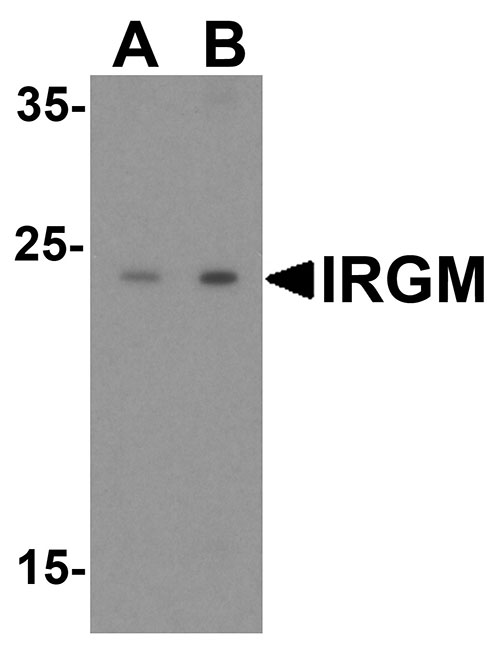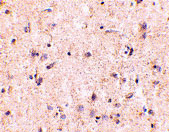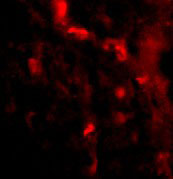IRGM Antibody
- SPECIFICATION
- CITATIONS
- PROTOCOLS
- BACKGROUND

Application
| WB, IHC-P, IF, E |
|---|---|
| Primary Accession | A1A4Y4 |
| Other Accession | AAI28169, 118764009 |
| Reactivity | Human, Mouse, Rat |
| Host | Rabbit |
| Clonality | Polyclonal |
| Isotype | IgG |
| Calculated MW | Predicted: 20 kDa Observed: 24 kDa |
| Application Notes | IRGM antibody can be used for detection of IRGM by Western blot at 1 - 2 µg/mL. Antibody can also be used for immunohistochemistry starting at 5 µg/mL. For immunofluorescence start at 20 µg/mL. |
| Gene ID | 345611 |
|---|---|
| Target/Specificity | IRGM; IRGM antibody may recognize mouse IRGM2 and IRGM3. |
| Reconstitution & Storage | IRGM antibody can be stored at 4℃ for three months and -20℃, stable for up to one year. As with all antibodies care should be taken to avoid repeated freeze thaw cycles. Antibodies should not be exposed to prolonged high temperatures. |
| Precautions | IRGM Antibody is for research use only and not for use in diagnostic or therapeutic procedures. |
| Name | IRGM {ECO:0000303|PubMed:19266026, ECO:0000312|HGNC:HGNC:29597} |
|---|---|
| Function | Immunity-related GTPase that plays important roles in innate immunity and inflammatory response (PubMed:16888103, PubMed:19165925, PubMed:25891078). Acts as a dynamin-like protein that binds to intracellular membranes and promotes remodeling and trafficking of those membranes (By similarity). Required for clearance of acute protozoan and bacterial infections by interacting with autophagy and lysosome regulatory proteins, thereby promoting the fusion of phagosomes with lysosomes for efficient degradation of cargo including microbes (PubMed:16888103, PubMed:25891078, PubMed:29420192, PubMed:32939830). Regulates selective autophagy, including xenophagy and mitophagy, both directly and indirectly (PubMed:16888103, PubMed:25891078, PubMed:29420192, PubMed:32939830). Directly regulates autophagy by acting as a molecular adapter that promotes the coassembly of the core autophagy machinery to mediate antimicrobial defense: IRGM (1) activates AMPK, which in turn phosphorylates ULK1 and BECN1 to induce autophagy, (2) promotes the coassembly of ULK1 and BECN1, enhancing BECN1-interacting partners and (3) influences the composition of the BECN1 complex, by competing with the negative regulators BCL2 and RUBCN, to trigger autophagy (PubMed:25891078). Also activates autophagy by promoting recruitment of STX17 to autophagosomes (PubMed:29420192). In collaboration with ATG8 proteins, regulate lysosomal biogenesis, a fundamental process for any autophagic pathway, by promoting TFEB dephosphorylation (PubMed:32753672). Also modulates autophagy by assisting with autophagosome formation and preventing lysosomal deacidification (By similarity). While activating autophagy, acts as a key negative regulator of the inflammatory and interferon responses both by (1) promoting mitophagy and (2) mediating autophagy- dependent degradation of effectors of the inflammatory response (PubMed:30612879, PubMed:32715615, PubMed:36221902). Promotes degradation of damaged and IFNG/IFN-gamma-stressed mitochondria via mitophagy, preventing cytosolic release of ligands that activate inflammation (PubMed:32715615). Acts as a suppressor of inflammation by promoting recruitment of inflammation effectors, such as CGAS, RIGI/RIG-I and NLRP3, to autophagosome membranes, leading to their SQSTM1/p62-dependent autophagic degradation (PubMed:30612879, PubMed:32715615). Also directly inhibits assembly of the NLRP3 inflammasome by preventing the association between NLRP3 and PYCARD (PubMed:30612879). Acts as a negative regulator of antiviral innate immune response by suppressing the RIPK2-dependent pro-inflammatory response: mediates recruitment of RIPosomes, composed of RIPK2 and NOD1 or NOD2, to autophagosome membranes, promoting their SQSTM1/p62- dependent autophagic degradation (PubMed:34467632, PubMed:36221902). |
| Cellular Location | Golgi apparatus membrane. Cell membrane {ECO:0000250|UniProtKB:Q60766}. Cytoplasmic vesicle, phagosome membrane {ECO:0000250|UniProtKB:Q60766}. Cytoplasmic vesicle, autophagosome membrane. Lysosome membrane {ECO:0000250|UniProtKB:Q60766}. Late endosome membrane {ECO:0000250|UniProtKB:Q60766}. Mitochondrion membrane {ECO:0000250|UniProtKB:Q60766}. Cell projection, phagocytic cup {ECO:0000250|UniProtKB:Q60766}. Note=Behaves like an integral membrane protein. Recruited to the plasma membrane around forming phagocytic cups, it remains associated with maturing phagosomes. Association with phagosomes is dependent on nucleotide-binding but is IFNG-independent Also detected in late endosomes and lysosomes {ECO:0000250|UniProtKB:Q60766} |
| Tissue Location | Widely expressed (at protein level) (PubMed:16888103). Expressed in several tissues including colon, small bowel and peripheral blood leukocytes (PubMed:17554261) |

Thousands of laboratories across the world have published research that depended on the performance of antibodies from Abcepta to advance their research. Check out links to articles that cite our products in major peer-reviewed journals, organized by research category.
info@abcepta.com, and receive a free "I Love Antibodies" mug.
Provided below are standard protocols that you may find useful for product applications.
Background
IRGM Antibody: Autophagy, the process of bulk degradation of cellular proteins through an autophagosomic-lysosomal pathway is important for normal growth control and may be defective in tumor cells. It is involved in the preservation of cellular nutrients under starvation conditions as well as the normal turnover of cytosolic components. Two of the strongest hits implicate genes IRGM and ATG16L1, which encode proteins thought to be critical to the autophagy pathway and being significantly associated with Crohn's disease. IRGM induces autophagy and generates large autolysosomal organelles as a mechanism for the elimination of intracellular Mycobacterium tuberculosis. In mouse, IRGM belongs to a family of gamma-interferon-induced GTP-binding proteins of approximately 48 kDa that also includes IRGM2 and IRGM3; this antibody may also recognize these proteins.
References
Gozuacik D and Kimchi A. Autophagy as a cell death and tumor suppressor mechanism. Oncogene 2004; 23:2891-906.
Massey DC and Parkes M. Genome-wide association scanning highlights two autophagy genes, ATG16L1 and IRGM, as being significantly associated with Crohn's disease. Autophagy 2007; 3:649-51.
Fisher SA, Tremelling M, Anderson CA, et al. Genetic determinants of ulcerative colitis include the ECM1 locus and five loci implicated in Crohn's disease. Nat. Genet. 2008; 40:710-2.
Singh SB, Davis AS, Taylor GA, et al. Human IRGM induces autophagy to eliminate intracellular mycobacteria. Science 2006; 313:1438-41.
If you have used an Abcepta product and would like to share how it has performed, please click on the "Submit Review" button and provide the requested information. Our staff will examine and post your review and contact you if needed.
If you have any additional inquiries please email technical services at tech@abcepta.com.













 Foundational characteristics of cancer include proliferation, angiogenesis, migration, evasion of apoptosis, and cellular immortality. Find key markers for these cellular processes and antibodies to detect them.
Foundational characteristics of cancer include proliferation, angiogenesis, migration, evasion of apoptosis, and cellular immortality. Find key markers for these cellular processes and antibodies to detect them. The SUMOplot™ Analysis Program predicts and scores sumoylation sites in your protein. SUMOylation is a post-translational modification involved in various cellular processes, such as nuclear-cytosolic transport, transcriptional regulation, apoptosis, protein stability, response to stress, and progression through the cell cycle.
The SUMOplot™ Analysis Program predicts and scores sumoylation sites in your protein. SUMOylation is a post-translational modification involved in various cellular processes, such as nuclear-cytosolic transport, transcriptional regulation, apoptosis, protein stability, response to stress, and progression through the cell cycle. The Autophagy Receptor Motif Plotter predicts and scores autophagy receptor binding sites in your protein. Identifying proteins connected to this pathway is critical to understanding the role of autophagy in physiological as well as pathological processes such as development, differentiation, neurodegenerative diseases, stress, infection, and cancer.
The Autophagy Receptor Motif Plotter predicts and scores autophagy receptor binding sites in your protein. Identifying proteins connected to this pathway is critical to understanding the role of autophagy in physiological as well as pathological processes such as development, differentiation, neurodegenerative diseases, stress, infection, and cancer.




